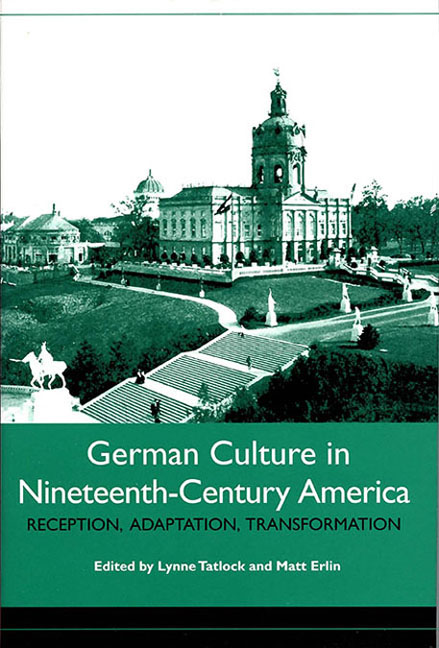Book contents
- Frontmatter
- Contents
- List of Illustrations
- Acknowledgments
- Introduction
- 1 Cultural Politics at the Turn of the Twentieth Century
- 2 In Pursuit of Intellectual Culture
- Absolute Speculation: The St. Louis Hegelians and the Question of American National Identity
- Reading Alexander von Humboldt: Cosmopolitan Naturalist with an American Spirit
- Nietzsche: Socialist, Anarchist, Feminist
- 3 Translation American Style
- 4 Immigration and Naturalization Acts
- Contributors
- Index
Absolute Speculation: The St. Louis Hegelians and the Question of American National Identity
from 2 - In Pursuit of Intellectual Culture
Published online by Cambridge University Press: 13 April 2017
- Frontmatter
- Contents
- List of Illustrations
- Acknowledgments
- Introduction
- 1 Cultural Politics at the Turn of the Twentieth Century
- 2 In Pursuit of Intellectual Culture
- Absolute Speculation: The St. Louis Hegelians and the Question of American National Identity
- Reading Alexander von Humboldt: Cosmopolitan Naturalist with an American Spirit
- Nietzsche: Socialist, Anarchist, Feminist
- 3 Translation American Style
- 4 Immigration and Naturalization Acts
- Contributors
- Index
Summary
Included among the papers in the William Torrey Harris archive at the Missouri Historical Society is a manuscript from the 1850s entitled “Do the signs of the times indicate a degeneration of American character?” In the essay Harris responds to his own question with a resounding “no” and offers a succession of examples to demonstrate America's continued intellectual and moral progress: two-thousand steamboats now ply waters previously navigated only by canoe, 300 daily newspapers have replaced the three that were available in the early republic, and perhaps most important, “throughout the land by every murmuring waterfall the ceaseless hum of the spindle or the ring of the mechanic's hammer is heard.” In response to those critics who detect a decline in religiosity and a corruption of morals, Harris contrasts early Puritan theocracy and superstition with the more recent spirit of Christian tolerance. Only the barbarous institution of slavery continues to mar America's great democratic experiment. According to Harris, however, it will soon suffer the fate of “its kindred institutions of the dark ages” (8).
William Torrey Harris was later to become the most famous of the three core members of the group now known as the St. Louis Hegelians. As legend has it, the group came into being one winter night in 1858, after a meeting of the St. Louis Literary and Philosophical Society at the Mercantile Library. Harris, who had come to St. Louis in 1857 with the intention of teaching shorthand, was approached and befriended by Henry Conrad Brokmeyer, a rough-hewn Prussian emigrant and self-taught proponent of German Idealism. Brokmeyer allegedly convinced him of Hegel's preeminence among modern philosophers, and, shortly thereafter, they and a few others began meeting to engage in a systematic study of his work. At the urging and with the financial support of the others, Brokmeyer also undertook a translation of Hegel's Wissenschaft der Logik (referred to as the Larger Logic), a project that would occupy him periodically for the rest of his life. Although the translation was never published, the book itself played a key role in the self-definition of the group, and of Harris in particular. The onset of the Civil War led to the dissolution of this initial company, but when Brokmeyer returned to St.
- Type
- Chapter
- Information
- German Culture in Nineteenth-Century AmericaReception, Adaptation, Transformation, pp. 89 - 106Publisher: Boydell & BrewerPrint publication year: 2005



